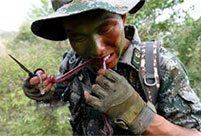

APPROVAL FROM CENTRAL GOVERNMENT
The traditional selection process of "drawing lots from the golden urn" was established in the late 18th century by Emperor Qianlong to prevent Tibetan Rinpoches from fighting for wealth and power.
The urn contained several ivory lots of the same size. Names of competing candidates were written on folded slips of paper placed in the urn.
"The lot-drawing process combines the Qing Empire's right to rule with Tibet's god-judging customs, which effectively prevents malpractice in the reincarnation system," said Zhukang Tubdankezhub, the 7th Zhukang Rinpoche and head of the Buddhist Association of China Tibet branch.
The urn is now enshrined at the Jokhang Temple in Lhasa. The urn only appears during the lot-drawing ceremony in front of the Sakyamuni statue.
A biography of the 10th Dalai Lama mentioned the lot-drawing process.
"Officials and senior monks sat in front of the emperor's portrait. Three slips of names were put in the urn," it said.
The reincarnation of the 13th Dalai Lama should have followed the process, but Lhamo Thonodup was exempted from the drawing through a concession by the central government. Similar situations have happened twice in history, both approved by the central government after the high commissioner stationed in Tibet reported to the emperor.
"Whether to approve or exempt lot drawing lies with the central government, which reflects the authority of the central government in Rinpoche reincarnation," said Chen Qingying, researcher with the China Tibetology Research Center.
On Feb. 22, 1940, the five-year-old Lhamo Thondup was enthroned as the 14th Dalai Lama at the Potala Palace.
Wu Zhongxin, chairman of the Commission for Mongolian and Tibetan Affairs of the central government at the time, presided over the ceremony. Wu's seat faced south, as did that of the Dalai Lama, to the east of the throne, marking the sovereignty of the central government over Tibet.
ONE MAN DOES NOT COUNT
The Dalai Lama, Tibetan Buddhism's highest spiritual authority, has been reincarnated in an unbroken line for nearly five centuries since the 3rd Dalai Lama Sonam Gyaco, according to religious belief.
The 14th Dalai Lama fled China in March 1959 in the wake of a failed coup to resist the slave abolition reform. Since then, he has lived abroad. His chances of returning to his homeland seem to be growing slim. The Chinese government has accused him of attempting to split the country.
Since 1959, the Dalai Lama and his followers have masterminded a series of seriously violent incidents, including the March 14 riots in Lhasa in 2008, when 18 innocent civilian were killed.
The current 14th Dalai Lama, who turned 80 earlier this month, said he may be the last Dalai Lama.
On at least four occasions since 2008, he said he would end the system. He has even said he is not certain whether he has the same soul as his predecessors.
At the same time, he appears to be inappropriately playing tricks with the Buddhist tradition. He said on several occasions that his reincarnation could be an Indian, a Mongolian, a Kalmykia, a European, a bee or even a "mischievous blonde woman."
In a recent interview with the New York Times, the 80-year-old monk hinted that he would hold some kind of referendum among Tibetan exiles, and consultations among Tibetans within China, about whether a new Dalai Lama should succeed him.
He also commented that "the Chinese Communist Party is pretending that they know more about the reincarnation system than Dalai Lama".
"He (The 14th Dalai Lama) is treating the sacred reincarnation system as a child's game," said Lian Xiangmin, a researcher with the China Tibetology Research Center.
"It's not the first time he has pejoratively and arbitrarily trampled Tibetan Buddhist rituals," he said.
The 14th Dalai Lama's attempt to end the reincarnation system is meant to abolish the central government's jurisdiction in historical convention and religious ritual in order to achieve his political goals, said Cedain Zhaxi.
"It is a dual betrayal, both politically and religiously," said Zhu Weiqun, head of the Ethnic and Religious Affairs Committee of the National Committee of the Chinese People's Political Consultative Conference, the national political advisory body.
"The reincarnation of the Dalai Lama has to be endorsed by the central government, not by any other side, including the Dalai Lama himself," said Zhu.
The 14th Dalai Lama's attempt to end the reincarnation system is meant to mislead the central government and the public in order to retain the title within the clique and serve their separatist purposes, said Zhu.
"The heritage and development of Tibetan Buddhism cannot succeed without the Rinpoche reincarnation system," said the 7th Reting Rinpoche, 18, who was enthroned as the reincarnation of the 6th Reting Rinpoche in 2000.
"I hope the system will last forever," he said.
The system, which Tibetans have believed in for centuries, cannot be ended by a single person, said Qin Yongzhang, a researcher with the Institute of Ethnology and Anthropology under the Chinese Academy of Social Sciences.
A Rinpoche title represents power and status in politicians' eyes, but for common Tibetans, belief in the reincarnation of Rinpoches is a central part of life.
Tashi, a 48-year-old herder in Yushu Tibetan Autonomous Prefecture, Qinghai Province, could not say when his daughter's birthday is, but remembers clearly the birthday of the Sakyamuni Buddha.
Tashi lives a humble life. He digs for Chinese caterpillar fungus 40 km from his home every year to support his family. He has a Buddha hall where he lights butter lamps and prays every day.
"Should the Rinpoche not reincarnate, my Buddha hall would collapse," said Tashi.
 PLA soldiers eat raw snake meat in harsh training
PLA soldiers eat raw snake meat in harsh training Doctors use 3D-printed skull to save girl
Doctors use 3D-printed skull to save girl Yunnan-Myanmar Road: The past and present
Yunnan-Myanmar Road: The past and present Campus belle of Xiamen University gets popular online
Campus belle of Xiamen University gets popular online Who says moms cannot be trendy and hot?
Who says moms cannot be trendy and hot? 10 Chinese female stars with most beautiful faces
10 Chinese female stars with most beautiful faces Stunning photos of China's fighter planes
Stunning photos of China's fighter planes Eight fruits that defend men's health
Eight fruits that defend men's health  Top 10 secrets of longevity
Top 10 secrets of longevity Investors worried about impact from futures
Investors worried about impact from futures Accusations over GDP figures are frivolous
Accusations over GDP figures are frivolous Dream jobs: wiped workers recharge with power naps
Dream jobs: wiped workers recharge with power naps Chinese man throws birthday pool party for pet sea lion at luxury hotel
Chinese man throws birthday pool party for pet sea lion at luxury hotelDay|Week